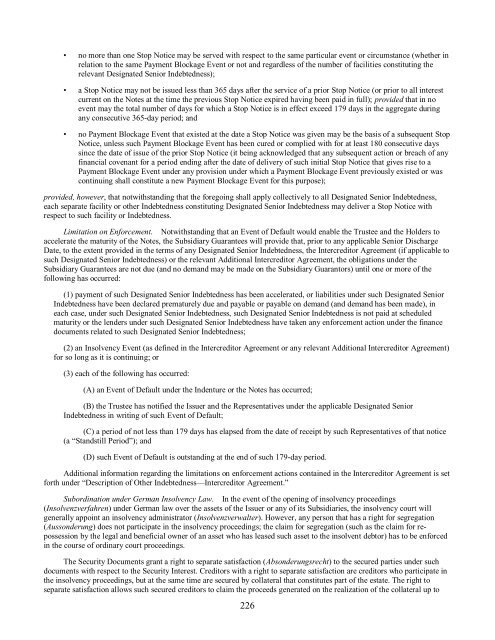iesy Repository GmbH - Irish Stock Exchange
iesy Repository GmbH - Irish Stock Exchange
iesy Repository GmbH - Irish Stock Exchange
You also want an ePaper? Increase the reach of your titles
YUMPU automatically turns print PDFs into web optimized ePapers that Google loves.
• no more than one Stop Notice may be served with respect to the same particular event or circumstance (whether in<br />
relation to the same Payment Blockage Event or not and regardless of the number of facilities constituting the<br />
relevant Designated Senior Indebtedness);<br />
• a Stop Notice may not be issued less than 365 days after the service of a prior Stop Notice (or prior to all interest<br />
current on the Notes at the time the previous Stop Notice expired having been paid in full); provided that in no<br />
event may the total number of days for which a Stop Notice is in effect exceed 179 days in the aggregate during<br />
any consecutive 365-day period; and<br />
• no Payment Blockage Event that existed at the date a Stop Notice was given may be the basis of a subsequent Stop<br />
Notice, unless such Payment Blockage Event has been cured or complied with for at least 180 consecutive days<br />
since the date of issue of the prior Stop Notice (it being acknowledged that any subsequent action or breach of any<br />
financial covenant for a period ending after the date of delivery of such initial Stop Notice that gives rise to a<br />
Payment Blockage Event under any provision under which a Payment Blockage Event previously existed or was<br />
continuing shall constitute a new Payment Blockage Event for this purpose);<br />
provided, however, that notwithstanding that the foregoing shall apply collectively to all Designated Senior Indebtedness,<br />
each separate facility or other Indebtedness constituting Designated Senior Indebtedness may deliver a Stop Notice with<br />
respect to such facility or Indebtedness.<br />
Limitation on Enforcement. Notwithstanding that an Event of Default would enable the Trustee and the Holders to<br />
accelerate the maturity of the Notes, the Subsidiary Guarantees will provide that, prior to any applicable Senior Discharge<br />
Date, to the extent provided in the terms of any Designated Senior Indebtedness, the Intercreditor Agreement (if applicable to<br />
such Designated Senior Indebtedness) or the relevant Additional Intercreditor Agreement, the obligations under the<br />
Subsidiary Guarantees are not due (and no demand may be made on the Subsidiary Guarantors) until one or more of the<br />
following has occurred:<br />
(1) payment of such Designated Senior Indebtedness has been accelerated, or liabilities under such Designated Senior<br />
Indebtedness have been declared prematurely due and payable or payable on demand (and demand has been made), in<br />
each case, under such Designated Senior Indebtedness, such Designated Senior Indebtedness is not paid at scheduled<br />
maturity or the lenders under such Designated Senior Indebtedness have taken any enforcement action under the finance<br />
documents related to such Designated Senior Indebtedness;<br />
(2) an Insolvency Event (as defined in the Intercreditor Agreement or any relevant Additional Intercreditor Agreement)<br />
for so long as it is continuing; or<br />
(3) each of the following has occurred:<br />
(A) an Event of Default under the Indenture or the Notes has occurred;<br />
(B) the Trustee has notified the Issuer and the Representatives under the applicable Designated Senior<br />
Indebtedness in writing of such Event of Default;<br />
(C) a period of not less than 179 days has elapsed from the date of receipt by such Representatives of that notice<br />
(a “Standstill Period”); and<br />
(D) such Event of Default is outstanding at the end of such 179-day period.<br />
Additional information regarding the limitations on enforcement actions contained in the Intercreditor Agreement is set<br />
forth under “Description of Other Indebtedness—Intercreditor Agreement.”<br />
Subordination under German Insolvency Law. In the event of the opening of insolvency proceedings<br />
(Insolvenzverfahren) under German law over the assets of the Issuer or any of its Subsidiaries, the insolvency court will<br />
generally appoint an insolvency administrator (Insolvenzverwalter). However, any person that has a right for segregation<br />
(Aussonderung) does not participate in the insolvency proceedings; the claim for segregation (such as the claim for repossession<br />
by the legal and beneficial owner of an asset who has leased such asset to the insolvent debtor) has to be enforced<br />
in the course of ordinary court proceedings.<br />
The Security Documents grant a right to separate satisfaction (Absonderungsrecht) to the secured parties under such<br />
documents with respect to the Security Interest. Creditors with a right to separate satisfaction are creditors who participate in<br />
the insolvency proceedings, but at the same time are secured by collateral that constitutes part of the estate. The right to<br />
separate satisfaction allows such secured creditors to claim the proceeds generated on the realization of the collateral up to<br />
226

















